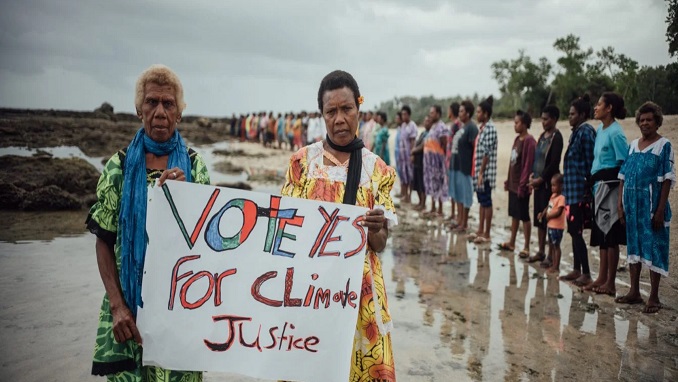In a global win in tackling the climate emergency, the United Nations General Assembly on Wednesday adopted through consensus a Pacific-led historic resolution aimed at bringing climate change, intergenerational justice, and human rights to the International Court of Justice (ICJ).
Pushed for years by Vanuatu and Pacific islander youth and co-sponsored by more than 130 member states, the resolution is calling for the world body’s top court to outline nations’ legal obligations related to climate change and protecting Earth’s climate and the legal consequences they face if they don’t.
Under the 2015 Paris Agreement, nations have no legal obligation to meet emission reduction targets, but the hope is that the new climate resolution could offer some pathways for enforcement along with other instruments like the UN Convention on the Law of the Sea and the Universal Declaration of Human Rights.
Following the vote, the UN Secretary-General Antonio Guterres emphasized that even if non-binding, an opinion from the ICJ would assist the UNGA, the UN and member states to take bolder and stronger climate action.
Also, they carry a significant legal and moral weight, and national courts are often taken it into account.
In line with the resolution, whose adoption sends a loud and clear message, as Vanuatu’s Prime Minister Ishmael Kalsakau pointed out, the ICJ should clarify the states’ obligations under international law to ensure the climate system’s protection.
Shaina Sadai of the Union for Concerned Scientists advocacy group described the new resolution as the most important global move since the Paris Agreement because it centers on two critical points – human rights and intergenerational equity- when addressing climate change.
After a campaign for an ICJ advisory opinion was initiated by a group of Vanuatu university students in 2019, it was picked up by the Vanuatu government which started lobbying for linking climate change and human rights in 2021 and put the resolution to the UNGA.
Its adoption came the same day when the European Court of Human Rights opened unprecedented cases in which governments are in the court’s dock for alleged climate change inaction.
France and Switzerland should now explain in front of the court their alleged failings to protect the environment.
It also comes just days after the administration of US President Biden – the self-acclaimed climate president – approved one of the largest “carbon bombs” on US soil: a massive oil and gas drilling project in Alaska that will last for decades. The approval was followed by an auction to drill 73m acres of the Gulf of Mexico for oil and gas.
Only a week ago, the UN’s panel of climate experts (IPCC) warned that only swift and drastic action can avert irrevocable damage to the planet following its report that said.



